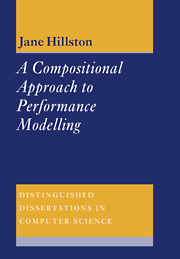Book contents
9 - Conclusions
Published online by Cambridge University Press: 24 November 2009
Summary
Introduction
In this chapter the main results of the thesis are summarised. The extent to which these address the problems facing performance analysis, identified in Section 2.4, is assessed. In Section 9.4, the direction for further work and future development of PEPA, as it appeared at the end of the thesis, are discussed. The chapter concludes with a review of work which has been developed since the thesis was completed, particularly examining the extent to which the areas outlined in Section 9.4 have been addressed.
Summary
A compositional approach to performance modelling has been presented. This novel model construction technique, based on the stochastic process algebra PEPA, has been shown to be suitable for specifying a Markov process. This underlying process can subsequently be solved using any appropriate numerical technique. The ease with which models can be constructed and modified using PEPA was demonstrated in the case studies presented in Chapter 4. For example, when the effect of a faulty component was to be investigated, only the relevant component within the model had to be modified.
As outlined in Section 3.6, one of the major advantages of PEPA over the standard paradigms for specifying stochastic performance models is the inherent apparatus for reasoning about the structure and behaviour of models. In the later chapters of the thesis this apparatus has been exploited to define four equivalence relations over PEPA components. Each of these notions of equivalence has intrinsic interest from a process algebra perspective.
- Type
- Chapter
- Information
- A Compositional Approach to Performance Modelling , pp. 137 - 144Publisher: Cambridge University PressPrint publication year: 1996

